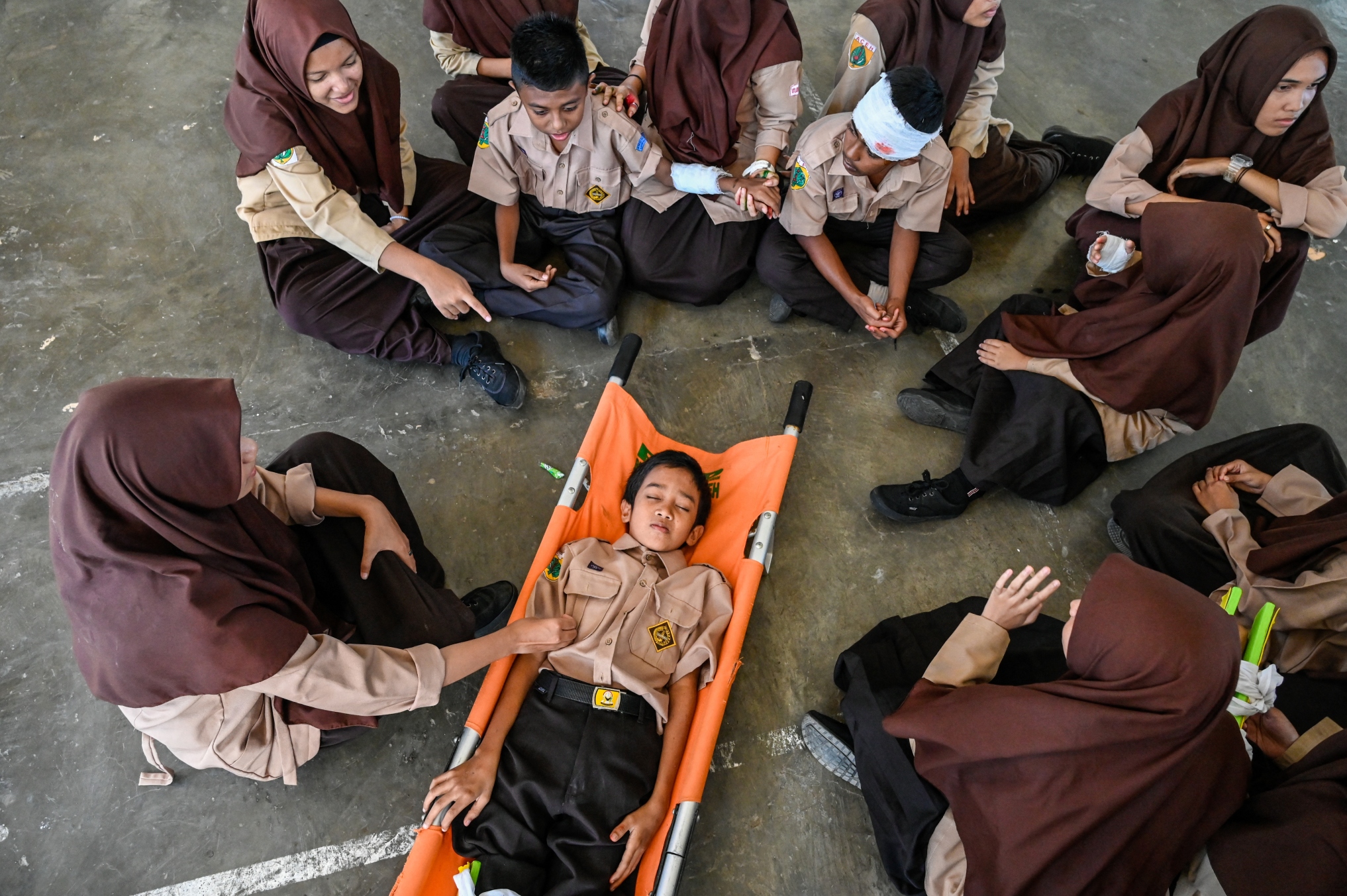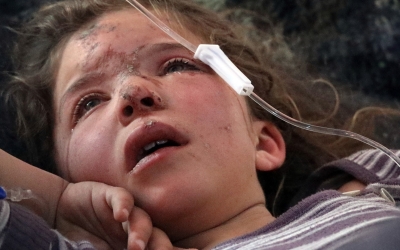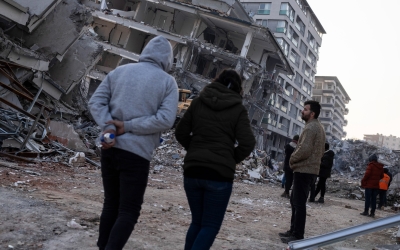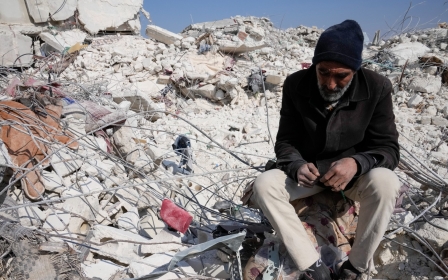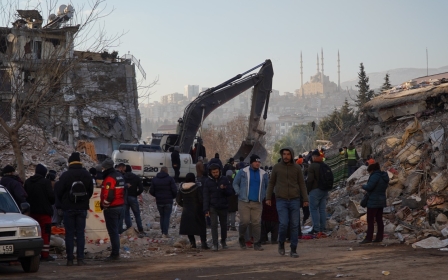Turkey earthquake: From China to Iran, natural disasters bring upheaval and change
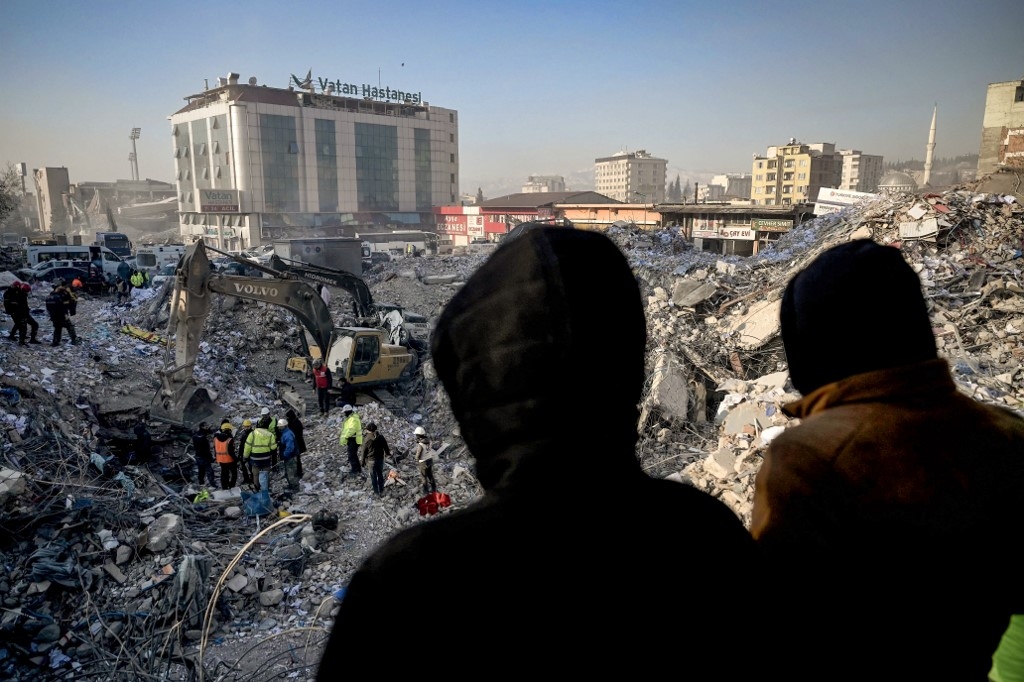
Turkey and northwest Syria are reeling from the worst earthquakes to have hit them in more than 80 years.
Beyond the immediate catastrophe, earthquakes have often been seen as harbingers of political change or upheaval, and markers of the end of ruling dynasties.
Like the 6 February quake in Turkey half a century later, at 3.42am on 28 July 1976 a 7.8-magnitude earthquake hit the city of Tangshan, in northeastern China, as its one million population slept. The powerful earthquake obliterated the city, killing more than 240,000 people - making it the second deadliest earthquake of the 20th century.
Catastrophic 'natural' disasters create the conditions for potential political change - often at the hands of a discontented civil society
In the aftermath of this disaster, many Chinese anticipated major changes in China’s politics. Mao Zedong was already on his deathbed, and died six weeks later on 9 September; the downfall of the Gang of Four quickly followed, and the Cultural Revolution came to an end.
There was an awareness among China’s communist rulers that in traditional Chinese belief, disasters are considered disruptions in the natural order of "heaven" (Tian) and may signify the loss of legitimacy (the "mandate of heaven") of the government.
This long-held belief does track to modern political analytics of natural disasters. As one author put it: “Anecdotal evidence suggests that the socio-political and cultural dynamics put into motion at the time of catastrophic ‘natural’ disasters create the conditions for potential political change - often at the hands of a discontented civil society."
China suffered another massive earthquake in 2008, in Sichuan, which killed 87,000 people and made millions homeless. The problem of shoddy construction was a major issue after the quake, notoriously in the case of hundreds of schools that collapsed as students sat in class, causing anguish and fury for countless families. Locals who tried to investigate official corruption that might have allowed substandard construction were pressured or arrested.
Bam earthquake, Iran
The devastating Bam earthquake in Iran in December 2003 may have marked a definitive disillusionment with the legitimacy of the Islamic Republic among swathes of the population.
An Iran Daily editorial summed up the popular mood: "Men, women, and children dying in the thousands only because the state machinery was ill-prepared for natural disasters is mind-boggling."
Iranians expressed a mixture of grief and anger at the loss of over 30,000 lives in the 26 December quake. "Our government only gives us slogans, but they don't give us proper building codes,” a frustrated Iranian told a local reporter.
Many expressed outrage that key buildings, like Bam's hospitals, collapsed so easily, with evidence of bribes used to circumvent building regulations. The widespread sense of corruption and violation of rules was a key element in the election campaign of conservative populist Mahmoud Ahmadinejad, who won a surprise victory in presidential elections 18 months later.
Disasters and conflict
Aside from the impact on government legitimacy, natural disasters can also impact long-running conflicts. This was seen in the 21st century’s most devastating tsunami to date, which struck the shores of the Indian Ocean on Boxing Day 2004.
Two of the worst-hit countries, Sri Lanka and Indonesia, were in the midst of long-running conflicts between their governments and armed rebel groups seeking autonomy or independence - the Tamil Tigers in Sri Lanka and the Free Aceh Movement (GAM) in Indonesia's Aceh region.
In the case of Sri Lanka, a year after the tsunami the war was stepped up, and brought to a bloody conclusion with the destruction of the Tamil Tigers in the final offensive of the Sri Lankan army on the Jaffa peninsula in 2009.
By contrast, in Aceh, in the wake of the disaster, a peace process began and within a year brought an end to 30 years of insurgency and the disarming of the Gam rebel movement. The Indonesian government's chief negotiator wrote: “The 2004 tsunami… helped to focus both sides on helping victims rather than fighting, and [brought] international pressure on Gam to enter talks.”
In Soviet-era Armenia, some analysts argue that the massive 1988 earthquake exacerbated existing tensions in the Nagorno-Karabakh region, accelerating conflict with Azerbaijan as the Soviet system lost its grip on the Caucasus republics.
Inter-ethnic clashes between Azeris and Armenians broke out after the parliament of the Nagorno-Karabakh autonomous region in Azerbaijan voted to unify with Armenia in February 1988. The disaster occurred 10 months later; Azerbaijan imposed a blockade on Armenia, and the war escalated.
With nearly all medical centres destroyed by the earthquake, an unprecedented international aid effort opened up Armenia to the West in a way not seen for many decades, and helped accelerate its journey to independence in 1991.
Pakistan: Sidelining civil society
A study of the impact of earthquakes on intra-state conflict through a statistical analysis of 185 countries, from 1975 to 2002, indicated that earthquakes “not only increase the likelihood of conflict, but that their effects are greater for higher-magnitude earthquakes striking more densely populated areas of countries with lower gross domestic products as well as pre-existing conflicts”.
Study author Dawn Brancati said: “Although many scholars, policymakers and relief organisations suggest that natural disasters bring groups together and dampen conflicts, earthquakes can actually stimulate intra-state conflict by producing scarcities in basic resources, particularly in developing countries where the competition for scarce resources is most intense.”
This is borne out in the case of the Pakistan earthquake of 2005: the military took a leading role in coordinating rescue efforts, but its response was widely criticised for sidelining civil society, and for the way it allowed militant groups to play a major role in rescue efforts.
The International Crisis Group said that by accepting a major role for banned jihadi groups in humanitarian relief efforts, the government’s policies helped militants bolster their presence in the earthquake-affected areas of the North West Frontier Province and Pakistan-administered Kashmir.
Pakistan soon found itself in a war with the home-grown Taliban that lasted years and cost tens of thousands of lives.
Turkey after the quake
So what are the lessons from these major disasters for Turkey, in the wake of its worst disaster for 80 years?
Turkey’s last major quake was almost a quarter of a century ago, in 1999. Some analysts saw it as a death knell for the secular political parties that had dominated Turkey for decades, exposing poor governance and neglect leading to unnecessary deaths and suffering.
There will be nowhere to hide for the Turkish government in the reckoning over a disaster that experts warned was coming
“The quakes shook not only the Anatolian tectonic plate but also the Turks' confidence in their much-respected secular elites who, soon after the quakes, were voted out of power for failing to respond in time to the devastating tremors,” wrote political scientist Soner Cagaptay in 2011. Following an economic crisis in 2000-2001, the Turks voted out these traditional elites, replacing them with Recep Tayyip Erdogan's Justice and Development Party (AKP), which has ruled ever since.
It is too early to say if the current catastrophe will mark another upheaval in Turkish politics. Slow arrival of rescue services at the epicentre in Hatay, as thousands remained trapped under collapsed buildings, has caused huge frustration among families and communities.
Elections are a few months away, if they go ahead as planned, but like the devastated skylines of Turkey’s quake-hit cities, the political landscape has already been changed. Kemal Kilicdaroglu, leader of the Republican People’s Party, accused Erdogan of “primary responsibility” for the failure of building regulations to be enforced, and the slow arrival of life-saving aid to the worst-hit areas.
The political consequences of the quake are going to be front and centre in the elections, and there will be nowhere to hide for the government over a disaster that experts warned was coming, given Turkey’s location on a major tectonic faultline. Growing popular anger over the disaster is being directed towards building contractors, the government and Syrian refugees.
For Syria, the hope must be that cooperation around getting aid to the disaster zone, between Assad government areas and the rebel-held northwest, plus the easing of western sanctions for the same reason, could start a process towards reconciliation.
It’s a faint hope - already toxified by blame battles between the UN and rebel groups over who is stopping aid getting in, and aid profiteering in government areas. But it is one that Syria desperately needs after 12 years of war.
The views expressed in this article belong to the author and do not necessarily reflect the editorial policy of Middle East Eye.
This article is available in French on Middle East Eye French edition.
Middle East Eye propose une couverture et une analyse indépendantes et incomparables du Moyen-Orient, de l’Afrique du Nord et d’autres régions du monde. Pour en savoir plus sur la reprise de ce contenu et les frais qui s’appliquent, veuillez remplir ce formulaire [en anglais]. Pour en savoir plus sur MEE, cliquez ici [en anglais].



